
Sheffield schools picked for government breakfast club scheme to tackle child poverty
Parents could save up to £450 a year from a new government initiative to curb child poverty, improve school attendance and increase educational attainment.
Primary school-aged children will be entitled to a free breakfast and their parents will have daily access to at least 30 minutes of free childcare anytime between 8am and 6pm which will alleviate their stress about getting to work.
The schools selected for this scheme were High Green Primary School, Carfield Primary School, and Totley All Saints CE Primary School.
Bridget Phillipson, the Education Secretary, said: "Breakfast clubs can have a transformative impact on the lives of children, feeding hungry tummies and fuelling hungry minds, so every child begins the day ready to learn."

The Department for Education announced this initiative as part of the greater plan to better support parents and tackle the issues children may face as a result of poverty which is on the rise. As of 2023, one in four children suffer from absolute poverty.
Government research have shown that breakfast clubs can bolster children's reading and writing skills and maths by an average of two months.
The 750 schools chosen across all nine regions could launch the scheme as early as this April. It is unclear how schools were picked as smaller neighbouring cities such as Doncaster and Bradford had more schools participating in the scheme.
However, schools were chosen from all across England to test and learn from a variety of locations including those that do not have an existing breakfast club. Of the 180,000 children in this phase, around 67,000 of them attend schools in deprived areas.
Schools will be provided the funding to cover food and staffing costs. They must provide nutritious breakfasts that adhere to government standards such as wheat bisks, porridge, fresh fruit, and yogurt. They will also host activities like arts and crafts, reading, and educational games.
Sir David Holmes CBE, Chief Executive of Family Action said: "We know that an effective breakfast provision delivered in a supportive and enriching environment can make the world of difference to a child."
The clubs come as part of a greater plan to reduce the cost of living for families. The government also aims to lower uniform costs through a cap on branded items and generate more government-funded care.
Kearsley West Primary School is one of the schools participating in the first phase. The Headteacher, Jackie Fitton, said: "For our school, the funding provided will be a real-life saver, ensuring we can provide a healthy breakfast and supportive start to the day for our pupils."
More information on the breakfast club policy will be given after the first phase has been tested appropriately while the access to childcare offer will continue to roll out across the country.
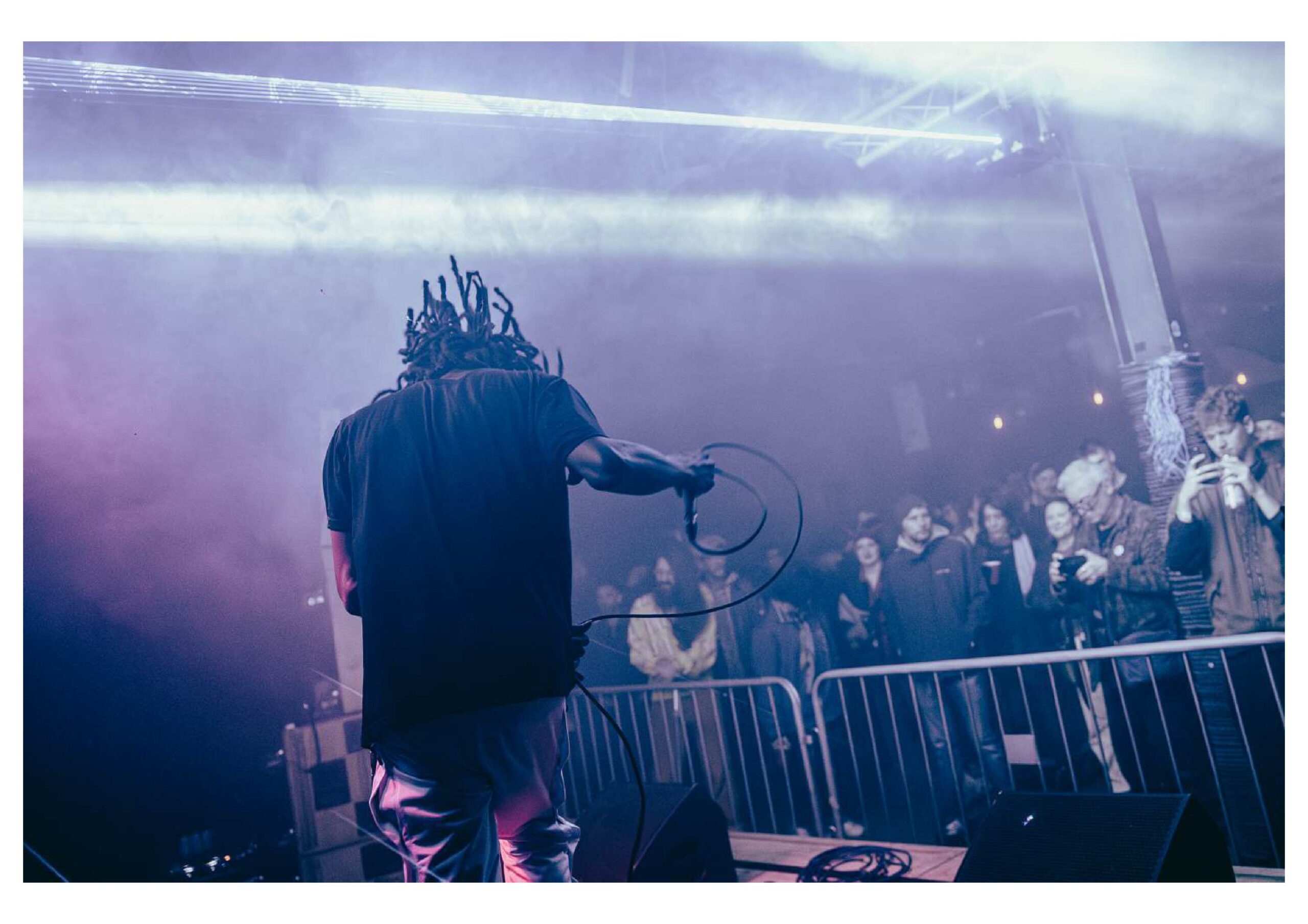
Final Goodbyes to Hope Works following Closing Weekend Party
Photography: James Ward
Hope Works, Sheffield's iconic underground electronic music venue, opened its doors for the last time on Saturday night.
The venue, which has been a vital part of the city's underground music and rave scene, was set up in November 2012 by Founder Liam O'Shea.
After 12 years, Liam announced on Instagram in December that the venue would be closing, with the closing party taking place at the end of February.
In his statement, Liam said: "[Hope Works] has been my passion, an act of determined resilience to create something in Sheffield like no other. A uniquely programmed beacon of hope and restless freedom in the Steel City."
It has to be said that running an underground music venue in today's ever shifting and volatile nightlife landscape has been challenging. We survived COVID and have delivered hundreds of parties since 2012.
"However for me to continue to expand my work into new areas and have time for my family, something needed to change."
Liam started a project called 'Mixed in Sheffield' back in 2009, which aimed to strengthen the electronic landscape of Sheffield.
As an artist himself, Liam 'Lo Shea' wanted to broaden Sheffield's musical range past the infamous indie scene and put it on the map as an underground music hub.
He began to set up multi-genre parties in the city, which resulted in creating a club night with his friends called 'Downlo' at night-life venue Dan Sane from 2010-2012 and shortly after, Hope Works was created.
Hope Works was originally a WWI gun barrel factory in the industrial heart of Sheffield before it was repurposed as an events place.
I've been told by so many people how Hope Works was the soundtrack to their university years or it introduced them to real rave culture.
At the event on Saturday, one partygoer said: "I moved over here in 2012 and this was the first nightclub I ever came to. Before I even moved to Sheffield, I came to this nightclub. It was nice to come and feel like I'd found somewhere I belonged."
Another first-timer at Hope Works said: "This is my first time here. From the door staff, to the people here, to the music that's on, it feels safe.
"Sheffield used to be indie music, now it's the kind of music we're here to listen to tonight."
Nowadays, you go into any club and you hear bassline. It's the sound of the city. That's what was so good about Hope Works - it was Sheffield sound.
While Hope Works will be missed, Liam has ensured that his festival 'No Bounds', which draws in crowds from all over the country, will continue to go ahead.
He says that Hope Works is "a story that's still ongoing".

Sheffield hospice appeals for donations in wills
A Sheffield Hospice has appealed for people to leave 'legacy gifts' in their wills to support their services due to a lack of public funding.
St Luke's Hospice has joined the Hospice UK ‘National Gift in Wills’ campaign, alongside 143 hospices across the UK. The campaign highlights the importance of caregiving and leaving legacy gifts to keep hospices running across the UK.
The charity’s Chief Executive Jo Lenton said: “The gifts we receive in wills are a crucial part of our charitable funding, paying for the care of one in six of our patients, and without them, we simply could not continue to exist as we do.”
Through the 'National Gift in Wills' campaign, people can leave a legacy gift or funds in their will to a hospice of their choice, which then helps caregivers provide future services for the ill.
Since hospice care is offered free of cost to those who are admitted to St. Luke’s care and services are estimated to cost around £14 million per year. Only a quarter of these funds are provided by the NHS and the government, the hospice is heavily reliant on public funds.
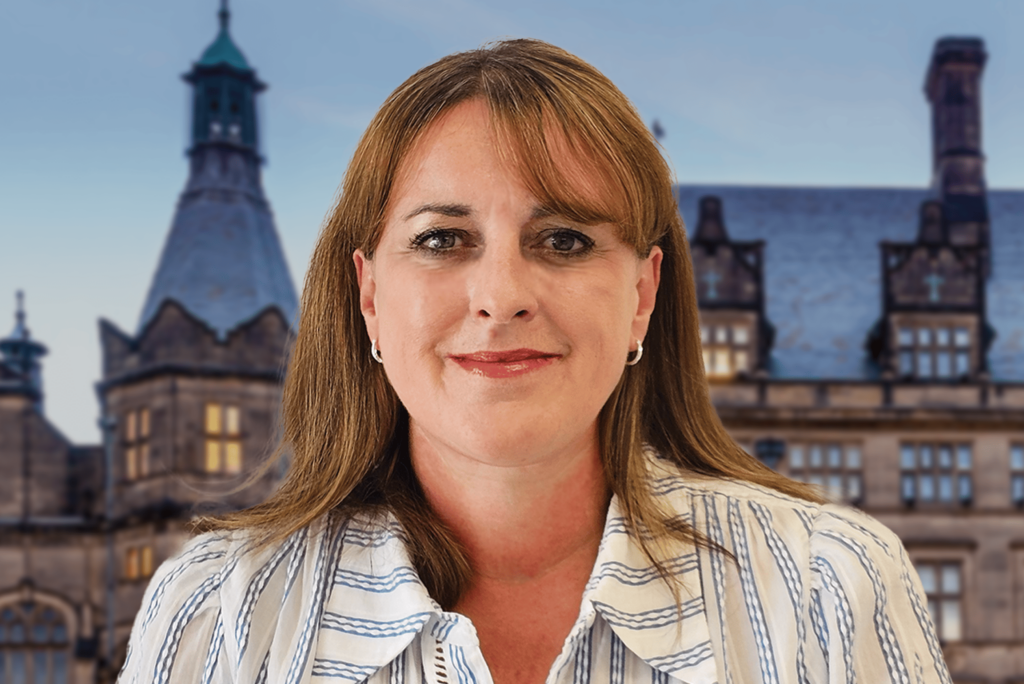
St. Luke’s looks after people over 18 across Sheffield with all kinds of terminal illnesses. Last year, the charity cared for around 1,800 patients – some of whom came to the hospice but many more were looked after at home by the St Luke’s team of community nurses.
Although St. Luke’s has participated in several campaigns over the years, this is their first time participating in a targeted campaign that not only raises money, but also raises awareness required to provide care for future generations.
John Highfield, the media relations manager at St. Luke’s believes that if the hospice decides to run solely on the government funds, then it would not be able to sustain for more than a few months.
“Public support is vital to our future. The 'Gift in Wills' campaign is one more way of saying to the people that one day you might need us, and we need to be there for you.”
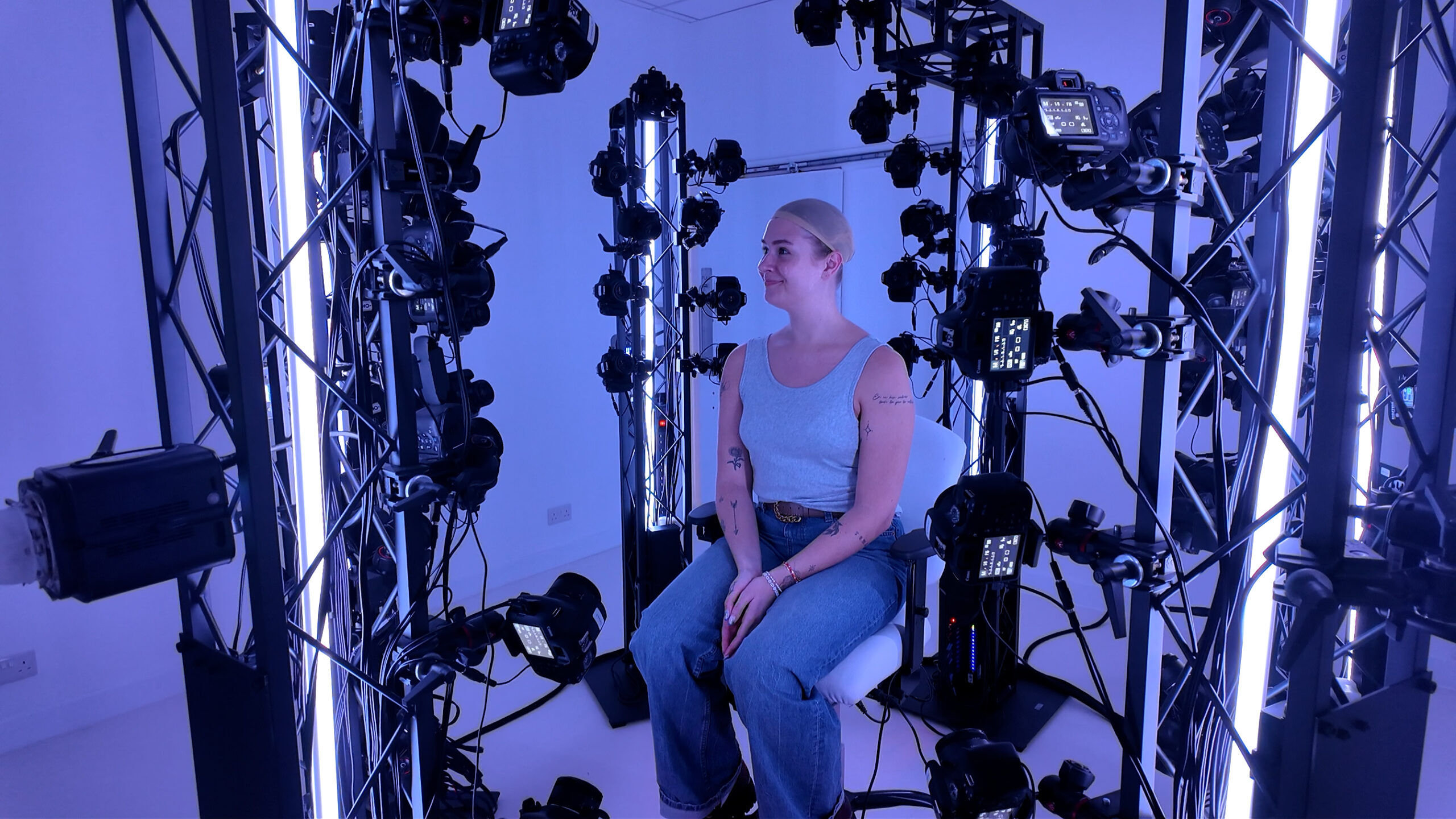
From playing Halo to being in Halo: Sheffield’s Ten24 offers people the chance to be in a video game
A Sheffield-based media studio is calling for 10,000 people to have their face 3D scanned to help create unique AI-generated video game characters.
Studio Ten24 said volunteers can earn £40 for taking part in its 'Sapiens Project', which has already scanned 1,000 faces so far.
Using 71 cameras set up at their office, people's faces are scanned in a process which takes a couple of seconds, and added to the massive database which Ten24 is building.
James Busby, Director at Ten24, said those who take part in the project can access the information they share, and ask for their data to be deleted at any point.
Mr Busby said: "We're trying to show big studios that you can do this ethically, you can pay people and you can build big databases that way."
He added that Ten24 is GDPR-compliant (General Data Protection Regulation), and has put measures in place to protect data from being scraped or shared without permission.
The AI industry is currently booming, and concerns have been raised worldwide about data privacy and safety as AI models scrape data from across the internet.
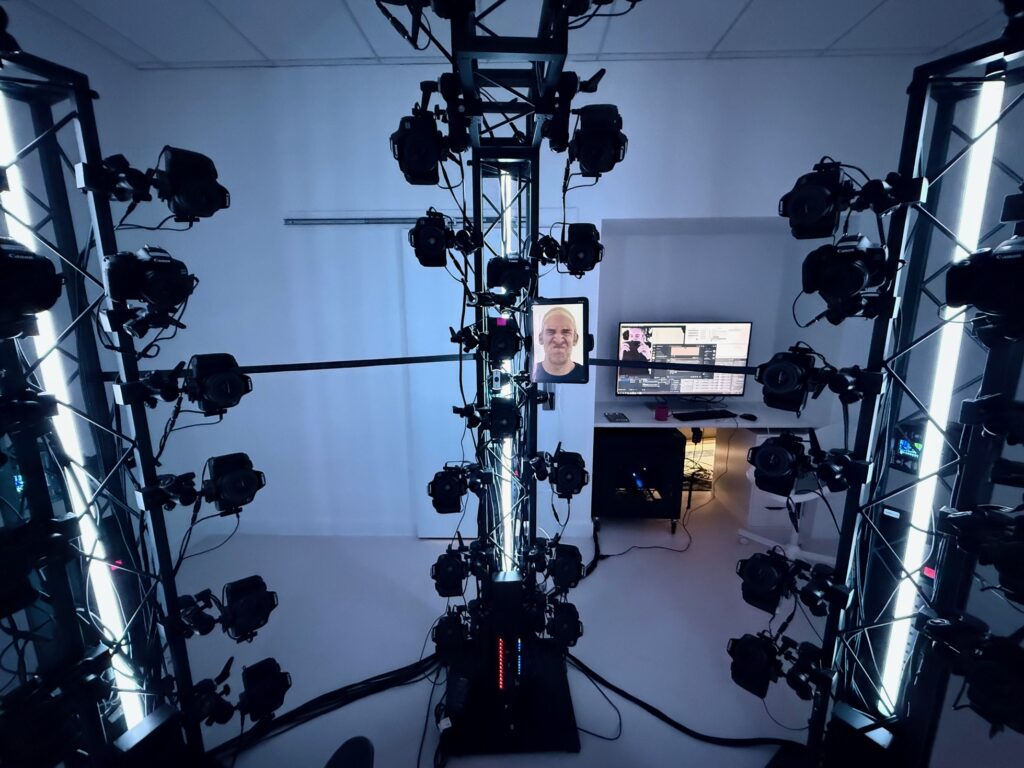
While there's a possibility to see your exact face in a video game, the studio said it's more likely that your face will be rendered alongside thousands of others to create a unique video game character instead.
Ten24 is a well-known support studio with an impressive portfolio to show for it, ever since their inception in 2008. The studio's work can be seen in blockbuster titles such as Baldur's Gate 3 (2024's Game of the Year), Death Stranding, Senua's Saga: Hellblade 2, Halo 4, and Kingsglaive: Final Fantasy XV among others.
The studio's 3D scanning endeavours transcend video games too, with their work also present in Alien: Isolation trailer, and an episode from Netflix's Love, Death & Robots.
Scans from the Sapiens Project may be used for such creative projects as well, and it may also be used for developing robotics, medical research, and improving AI models.
Those interested can visit the Sapiens store at the Orchid Square, with no restrictive perquisites in place about ethnicity, race, and gender.
Ten24 is actively looking to add diversity to their 3D scans so that they can provide a wide range of stock video game characters to game developers. Volunteers are required to be clean shaven and should not have any make up on.
Mr Busby revealed that they have not had a big turnout yet from the student population in Sheffield, but are hoping for more students to come in and volunteer.
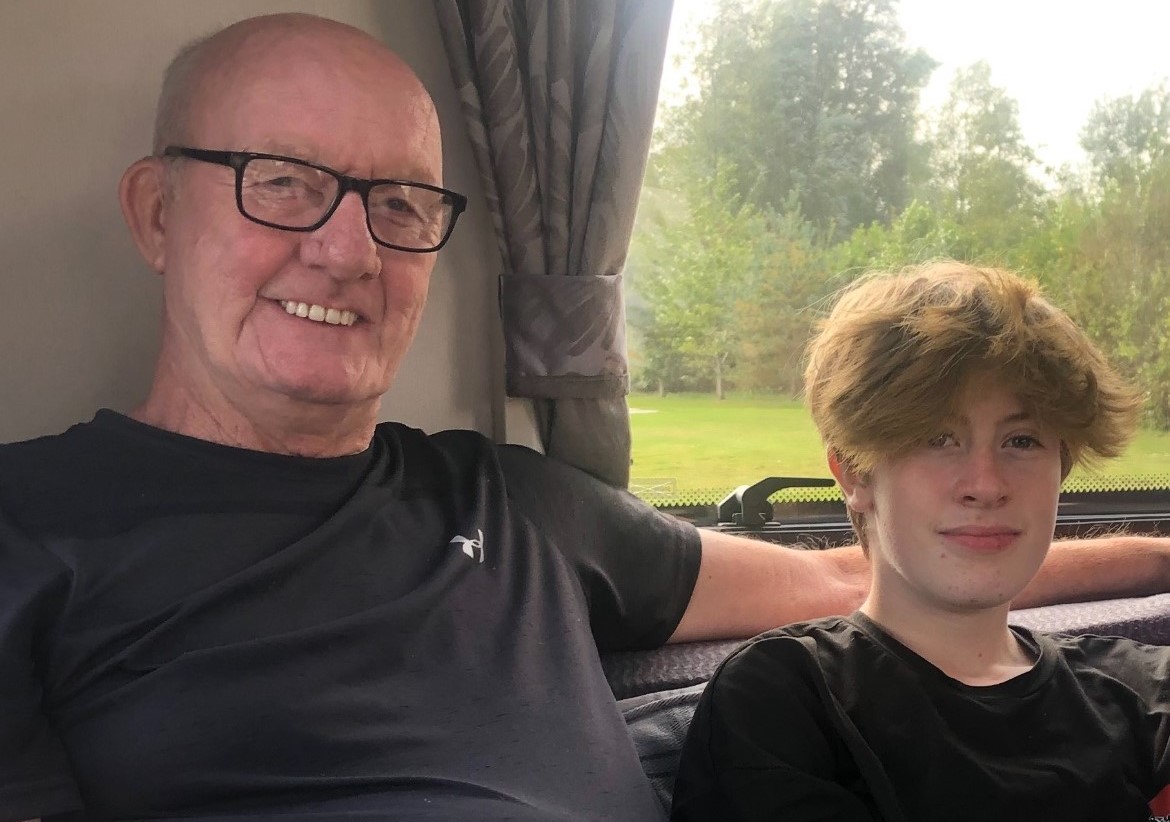
Teenager set to raise over £900 for Rotherham Hospice in Grandad’s memory
A school student from Handsworth is doing a sponsored run between the Sheffield United and Sheffield Wednesday stadiums this Sunday.
Daisy Oxley thanked Rotherham Hospice for the treatment of her Grandfather, Brendan McCarthy, and her family, saying: 'It gave us comfort, when we were with him and when we weren't, knowing he's safe and in good hands.'
Daisy comes from a football-loving family and decided that it would be fitting to run between the two stadiums for her Grandfather.
She said: "Football has always been a big part of mine and my family's lives.
"I wanted to do something in memory of my Grandad while also doing it for a good cause."
Daisy plays in two under 18 football teams in preparation - Chesterfield Ladies and Long Eaton United.
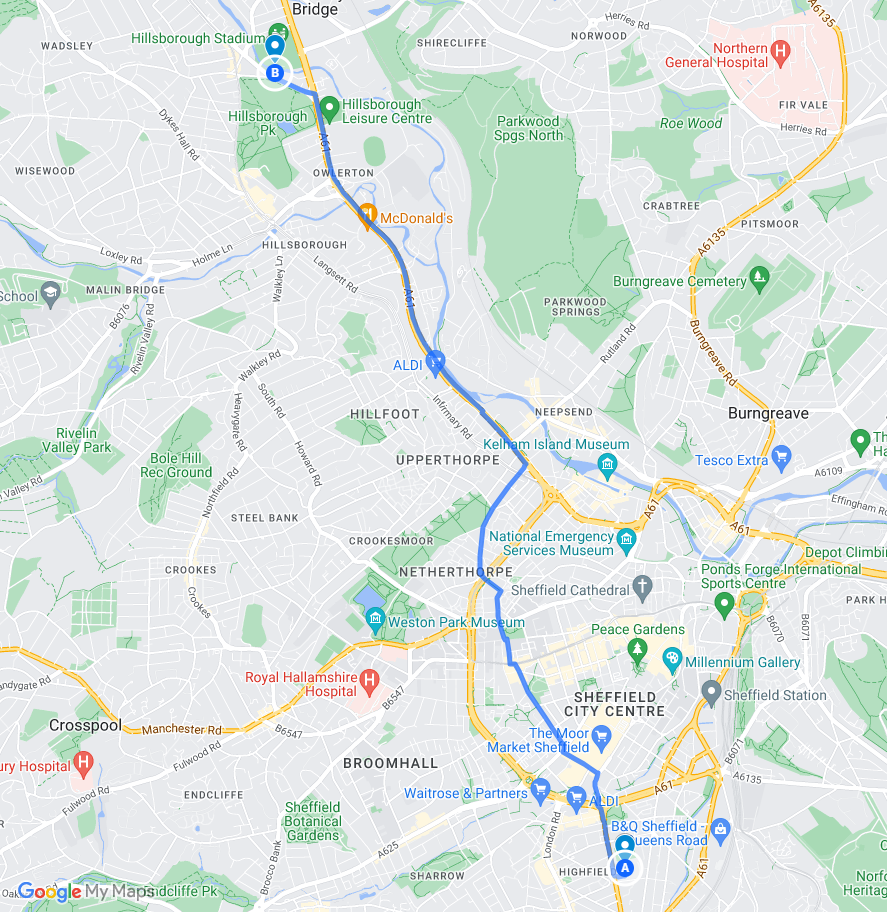
With five days left until the run, Daisy has raised around £900 across her GoFundMe and JustGiving pages.
Daisy hopes the money will go towards providing residents of the hospice with more activities and improved facilities.
A spokesperson for Rotherham Hospice said: "Running the five kilometres between Sheffield United and Sheffield Wednesday’s grounds is no small feat, and her dedication has already raised an incredible £910.
"Every pound she raises helps us continue providing vital care and support for the people of Rotherham, as we truly depend on the support of our local community. Daisy is making a real difference."
Daisy's fundarising page can be found here: Fundraising for Rotherham Hospice
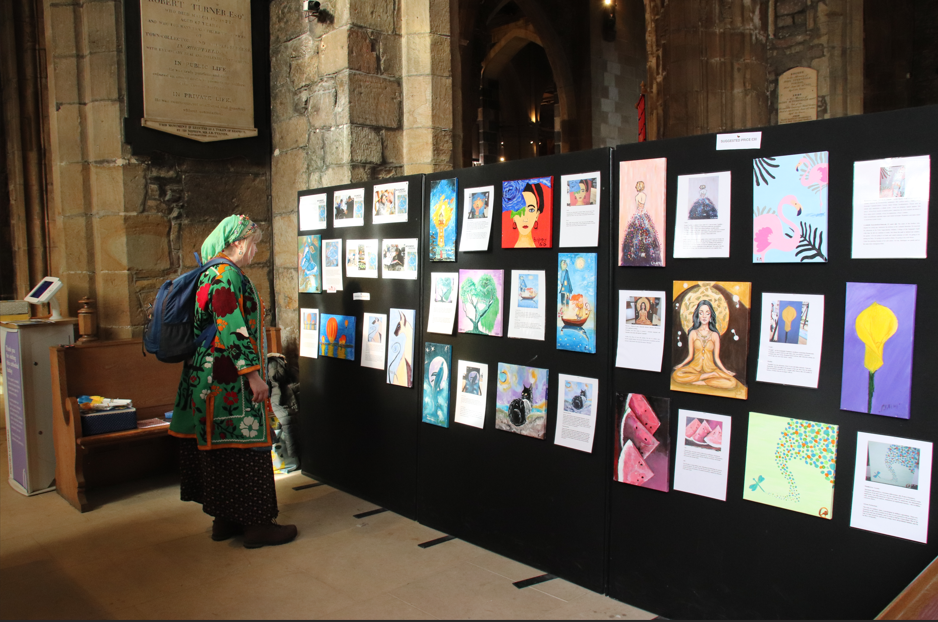
Sheffield Cathedral host exhibition to fundraise for medical supplies in Ukraine
Injured Ukrainian soldiers and families of the deceased expressed their "trauma and loss" through artworks, which were displayed at Sheffield Cathedral at the weekend.
The Wounded Ukraine exhibition, for the second year, presented a collection of amateur paintings created at art therapy sessions hosted at the Veterans' House in Rivne, Western Ukraine. The creators of the paintings included widows, mothers, and children who have endured trauma and loss as a result of Russia's war on Ukraine.
The exhibition, hosted by the Association of Ukrainians in Great Britain (AUGB), launched the weekend before the third anniversary of Russia's full-scale invasion of Ukraine and has aimed to raise money for medical supplies.
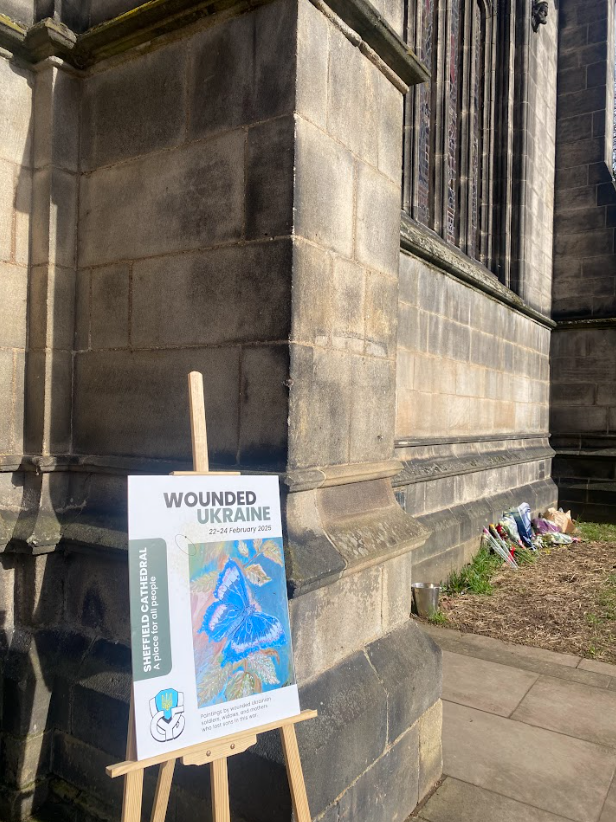
The Chair of the AUGB, Anton Ievsiushkin, said the exhibition is their way to do whatever they can to support the veterans, the people on the frontline, and their families.
He added: "Each painting shows the trauma and loss the individual is experiencing.
"They are all really moving when you understand more about what the person behind the painting was going through, but I try not to read the descriptions because I start crying."
Chair of the AUGB
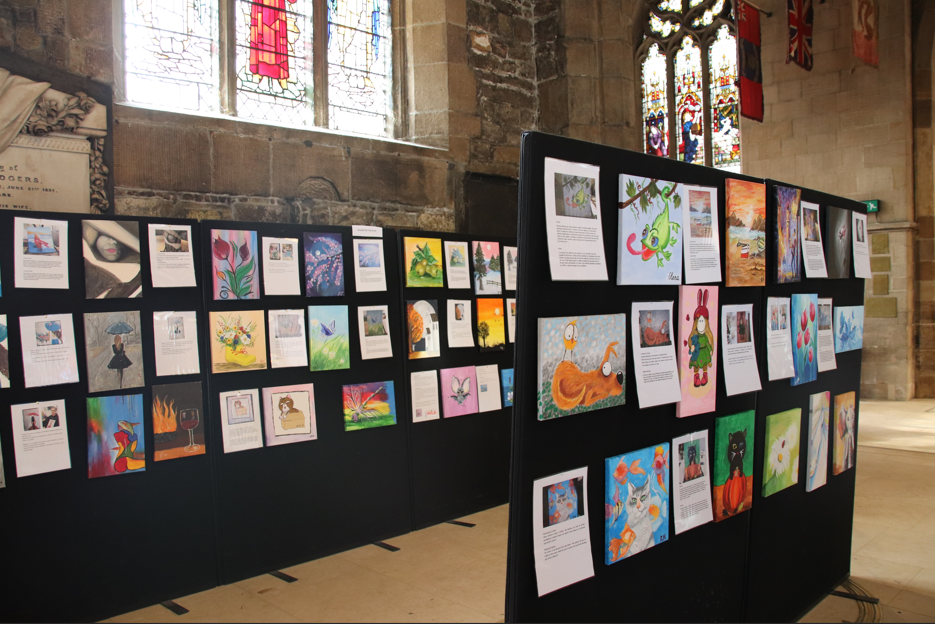
The head of the Veterans' House, Victoria Shynkarenko, began the project in 2018 after discovering that painting helped her when struggling with insomnia, which developed after serving on the frontline.
The center has now run over 600 art therapy sessions.
Chris Jones, a member of the Abbeydale Rotary, a charitable organisation that has worked to support Ukraine by sending food and toy boxes to Ukrainians, emphasised the importance of art therapy.
He said: "Art therapy, especially for children, allows people to broaden their mind and face their trauma through a healthy outlet."
The Cathedral additionally held a bilingual service of evening prayer on Sunday, the eve of the third anniversary of the invasion.
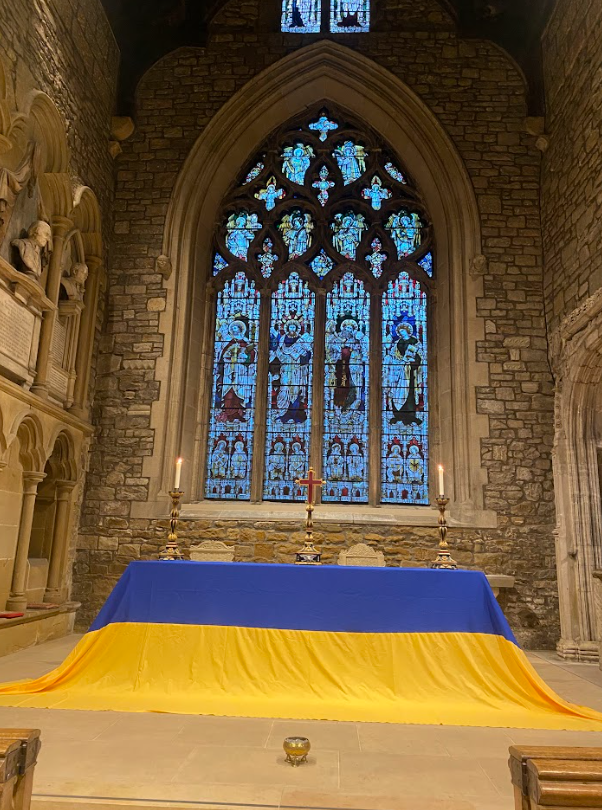
The Treasurer of the AUGB, Tanya Klymenko, read a prayer of reconciliation that pleaded: "God of love, we have seen injustices and done too little. We have given up on the work that makes for peace. We have neglected our neighbour who is far away. Turn our hearts to your ways and give us peace."
This evening, for the final night of the exhibit, the AUGB , alongside Sheffield City Council, has invited the people of Sheffield to join them for a vigil at the Winter Gardens at 5pm.
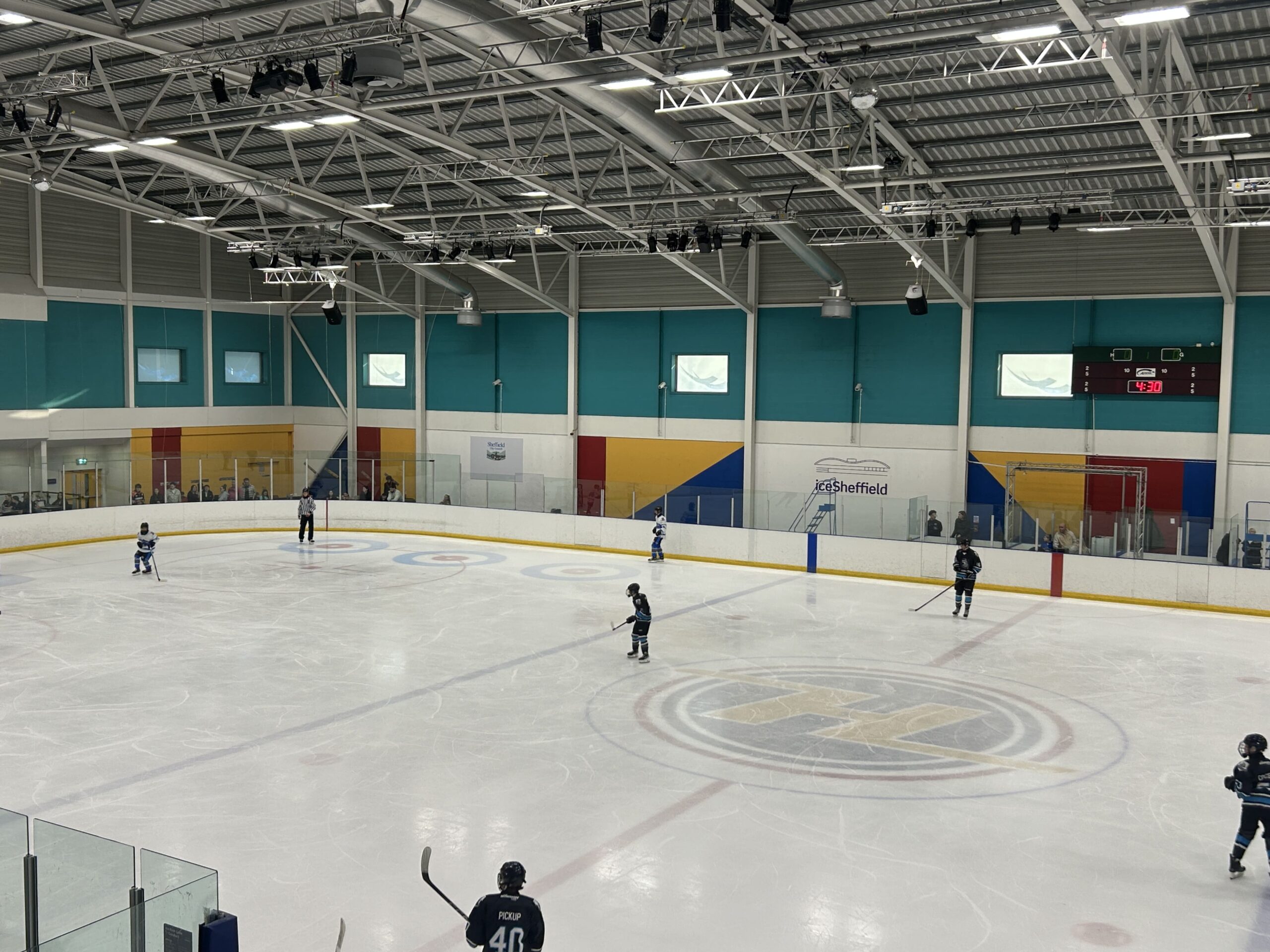
Sheffield Ice Hockey Academy’s U17 Team fundraise to compete in Europe
The Under 17 team from the Sheffield Ice Hockey Academy is raising money to go to Bratislava this August for an international Ice Hockey Tournament.
Sara Ball, the Treasurer, said “I think is really important so that we can try and alleviate some of the costs from the parents, but give these children the experience to go abroad, to play in a different country.”
The fundraiser is live on GoFundMe with a target of £1700 but Miss Ball explained the total cost would be £7000 for the team.
Whilst there are some players in the Academy who have played for England internationally, many of these young athletes will be playing abroad for the first time.
Lewis Ball, U17 player said: “It’ll be a good experience playing different kind of hockey there. I think it’ll be good for the team bringing everyone together so we’re ready for the season.”
Playing internationally helps players learn new gameplay and bond as a team.
Mark Illingworth, Head Coach explained: “It gives them a good understanding of the game. Not just limited to how we play in the UK but how they play abroad as well.”
Shooting to popularity in the 90s, Ice Hockey has made its place in the sports scene in England.
Mr Illingworth said: "In Sheffield, ice hockey has always been big."
"Our academy has got pathways right up to the Steelers which gives players many opportunities for progression."
Despite this, ice hockey remains significantly underfunded and a weekend camp away can cost up to £2000 per player.
You can find the fundraiser here: https://www.gofundme.com/f/u17-ice-hockey-team-travelling-to-europe
Watch here:

Sheffield weeps for teenage victim of knife crime
Sheffield came together to remember the city’s latest victim of knife crime on Friday and vowed that “this must never happen again”.
Over 750 people gathered in the rain at Sheffield Cathedral on Friday, 21 February, to pay their respects to Harvey Willgoose.
Speaking at the funeral service, Harvey’s sister, Sophie Willgoose, delivered a heartfelt poem about her brother: “One moment you’re here, next, you’re gone, leaving us, trying to carry on.”
The “loving and caring” 15-year-old’s life was tragically cut short when he was stabbed to death at his school, All Saints Catholic School.
Three weeks after he was stabbed to death, Harvey was laid to rest in a heartfelt ceremony attended by close family and friends, as well as well-wishers in the community.
His cousin Lana Swirles also recited stories about how Harvey’s laughter “was contagious, and his kindness knew no bounds.”
Harvey was lovingly called “Goose” by close friends and family and was a massive Blades fan.
At the service, Reverend Canon Abigail Thompson said: “None of us want to be here today, none of us want to be attending [Harvey's] funeral. This must never happen again. But we are here, and we are here for each other. ”
Since his death, the city has come together to rally against the rise of knife crime in the city and its massive impact on Sheffield’s community as a whole.
Knife crime has risen in the UK by a large percentage since March 2023, with juveniles (aged 10-17) being the offenders in around 17.3% of cases.
Offences involving the use of a knife have increased in the UK by 4.4% to 55,008 by September 2024 from 52,969 in the previous year.
The Office of National Statistics also said that South Yorkshire has been ranked the fourth worst area to live in the UK for knife crime, with 10.72 offences involving a knife per 10,000 people.
A change.org petition, with almost 40,000 signatures, is campaigning for “immediate action to address the growing epidemic of knife crime in schools." It says the increase in knife crime is accounted for by the lack of strict policies to ensure the safety of students.
The petition calls on the UK Government to implement mandatory bag checks, metal detectors, and airport-style body and bag scanners in all schools.
Another campaign on GoFundMe started on behalf of The Ben Kinsella Trust, hopes to increase public awareness around knife crime. The campaign has raised over £1,170, just short of its £1,400 target.
South Yorkshire Police’s campaign called Knives Take Lives continues to tackle this issue by supporting boys aged 11 to 14 who "may be starting to feel pressure to carry a knife".
If you’ve been affected by knife crime or are worried about knife crime in your area, contact South Yorkshire Police on 101, or Crimestoppers on 0800 555 111.

Burnley v Sheffield Wednesday: Striking 4-0 defeat validates club financial issues and criticisms of administration
Manager Danny Rohl remains hopeful for the Wednesday squad’s future despite just three wins in sixteen fixtures.
Friday’s match ended poorly for Rohl and the Owls, their defence being picked apart by Burnley.
Rohl said: “You saw the difference between the top team and us. It's hard to take.
I will take some positives but there are mistakes we make again and again. You need a perfect game here to give you a chance. But, we had a lot of opportunities, big chances.
Following relegation from the Premier League last term, Burnley are leaving a streak of clean sheets, now reaching the second place spot, holding their own for 12 consecutive games.
After conceding a goal by Marcus Edwards in the 43rd minute, the Owls lost control of play, letting Josh Brownhill put one past the line within 43 seconds of being subbed on.
Jaidon Anthony set Conor Roberts up for a quick tap in, sealing the 4-0 result.
This victory enabled Burnley to extend their winning streak to 21 games in their charge for a premier league slot.
Rohl is now preparing for their face-off against Sunderland this Friday, and said: “We have to try everything against Sunderland, we have this opportunity and I want to see a team who try everything.
“We have to step up and need the perfect game and for this, I look for the team for a perfect game.”

Amongst this was discussion of the club’s on-loan midfielder from Southampton, Shea Charles, who’s impressive record of one goal and four assists over 22 appearances is currently under threat by his current 9 yellow card record.
If Charles is given a yellow in the next fixture, he would be given a two match ban - without appeal. This would devastate the upcoming March Steel City Derby for Wednesday.
Following the transfer embargo amidst £81.9 million in financial liabilities, Wednesday are predicted to reconsider key player sales ahead of the summer transfer window, aiming to strengthen their lineup, alongside improving their monetary situation.
Amidst the losses and transfers, Wednesday owner Dejphon Chansiri is facing criticism from supporters following club financial issues, with this stunning loss being both a factor and a symptom of the problems.
EFL placed the club under a temporary transfer embargo, following a missed HMRC payment. No investors are currently being agreed upon, causing the growth of Chansiri’s “difficult” reputation and frustration from supporters.
View match highlights here: Burnley 4-0 Sheffield Wednesday
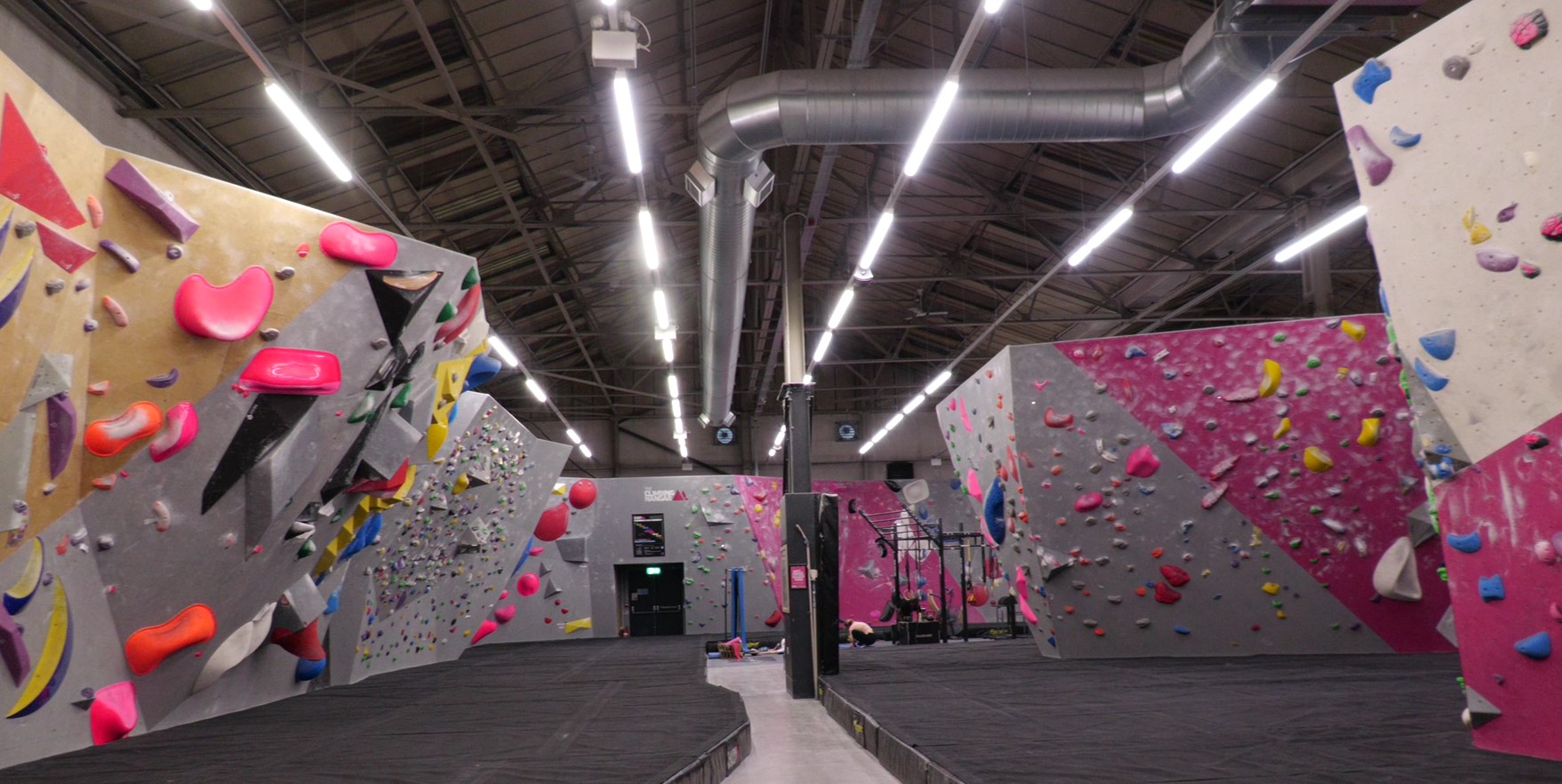
Women’s Climbing Symposium returns to Sheffield
A Sheffield climbing wall is hosting this year’s Women’s Climbing Symposium, an event that aims to positively impact women in the sport.
The Climbing Hangar, on Sutherland Street, Sharrow, is facilitating this year’s event, taking place on International Women’s Day, Saturday 8 March.
This will be the second year The Climbing Hangar Sheffield has hosted the symposium.
Geegee Morrison, a crew member at The Hangar who is helping at the event, said: “We are going to be using our past experience to try and provide a really fun and incredible event and make sure that everyone can feel included.
“It's an incredibly supportive day, it’s a really fun time. I’ve been so fortunate to be a part of it the last few years.”
A selection of guest speakers and coaches will run focus talks and workshops throughout the day.
This year’s Symposium headline speakers are British bouldering champion and 2024 Paris Olympian Erin McNeice, and British alpinist and North Face athlete Fay Manners.
Erin McNeice took on the 2024 Paris Olympics, earning fifth place in the combined boulder and lead event.

Mi Amigo Plane Crash Commemorated 81 Years On
Adrian Collis & Grace Kulinski
The 81st anniversary of the crash of a World War Two US bomber was commemorated this weekend with a memorial service at Endcliffe Park.
The plane, Mi Amigo, crashed in the park on 22 February 1944 after returning from a bombing raid, killing all 10 US pilots onboard.
The crew sacrificed their lives by downing their plane in trees to avoid hitting surrounding houses and children playing in the park.
The crash was witnessed by Tony Foulds, who was eight at the time - he has since dedicated his life to preserving the site of the memorial.
Mr Foulds said: "They had to make a decision, quick. Shall we try and miss these children in the park to land, or shall we die?
"They decided to die."
Broadcaster Dan Walker, who helped arrange a flypast on the 75th anniversary in 2019, joined Tony at the memorial this year for the unveiling of a new bench to remember the crew of Mi Amigo.
Also in attendance of the memorial was Amy Priddy, from Arkansas, US, who is the great niece of Malcolm Williams, one of the airmen who died in the crash.
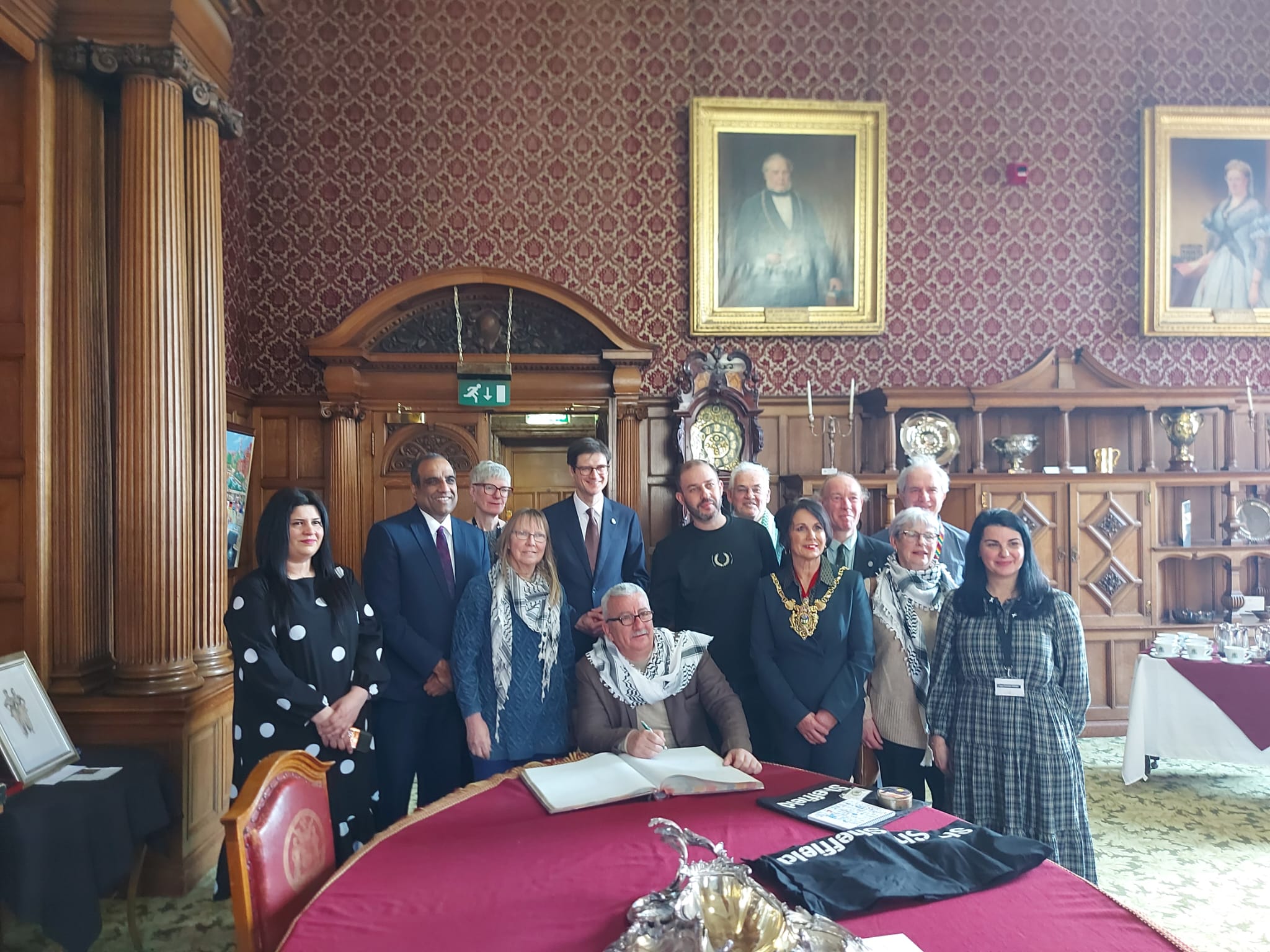
“We must live in peace”: Sheffield hosts Palestinian speakers to strengthen friendship
A week-long series of events to build on Sheffield’s new friendship agreement with the Palestinian city of Nablus in the occupied West Bank concluded with a migrant solidarity event at the City of Sanctuary.
Three activists were invited to Sheffield for a speaking tour that included meetings with elected officials at Town Hall, visits to community groups including Mums United and interfaith initiatives.
Amjad Refaie, a refugee services committee member at the New Askar camp, said: “I am very happy to be among all the people who really give us the energy and the power to continue our struggle.”
This was echoed by Tareq Draidi, who works at the An-Najah National University in Nablus, who said: “we were told, if you go to the North, you will meet so many warm people…I can feel your feelings about supporting Palestine.”
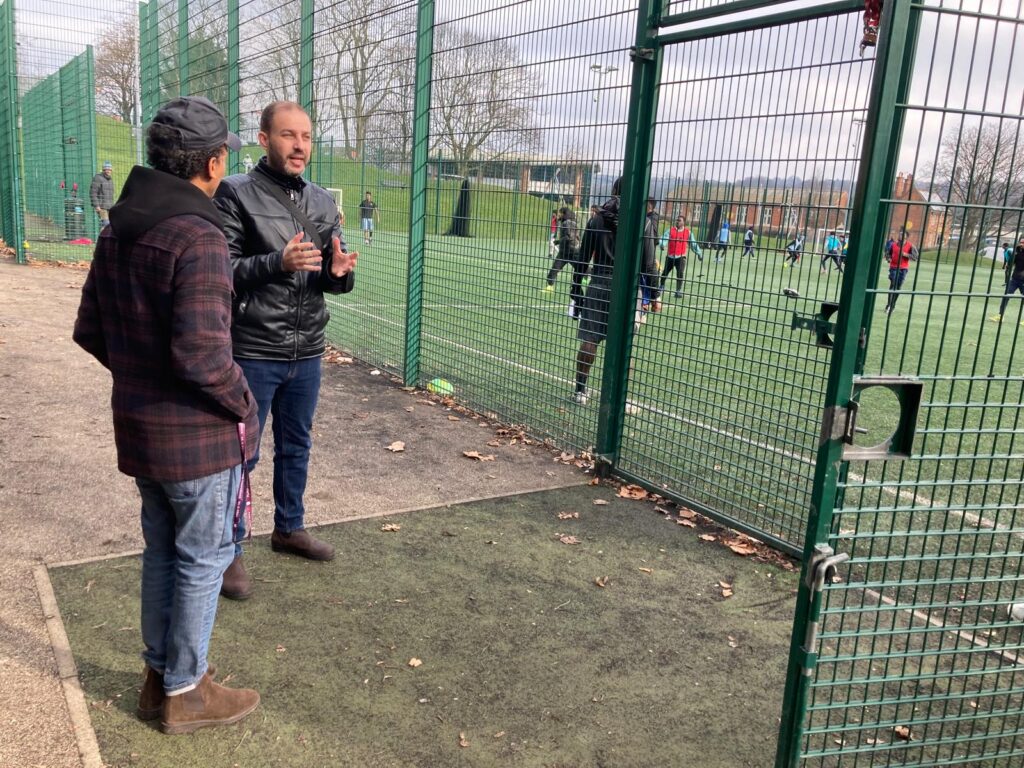
Mr Refaie also spoke of the bittersweet emotions aroused by the visit, by noting his sadness of being “in the country that gave our land to another people…[instead] now I must be in Jaffa”, referencing the Balfour Declaration of 1917.
He also recalled the interruption of his own youth, after he was first incarcerated at just 15-years-old.
“I started my life inside the jail. I was arrested on the 28th of May 1986, I will never forget this day.”
Mr Refaie highlighted the deteriorating situation back home and suggested that “the price of stopping in Gaza was the West Bank” about the ongoing ceasefire in the Strip, as violence escalates in other parts of the Occupied Territories.
Seham Hasanain, one of the visitors who accompanied Mr Refaie to Sheffield, spoke about the role of the United Nations Relief and Works Agency (UNRWA).
The organisation, which was set up in 1949, runs schools and healthcare services in the Occupied Territories and Palestinian refugee camps in neighbouring states, and she warned about the impact on “unemployment and poverty” if they were prevented from operating.
The Israeli parliament, Knesset, passed a motion last October to render UNRWA’s work illegal.
Earlier this week, Israeli forces in occupied East Jerusalem attempted to shut an UNRWA training centre with “tear gas and sound bombs” being used, according to UNRWA Commissioner-General Philippe Lazzarini.
Ms Hasanain explained the work being done by the social centre she works at in the New Askar camp, and how it collaborates with “feminist and disabled organisations”.
During a discussion with Sheffield city councillors on Friday, she said that creative outlets like “art, painting and drawing” were also made available to young people.
Councillor Dawn Dale, who is Chair of the Education, Children and Families Policy Committee, spoke of the importance of safeguarding play for children, especially within conflict zones.
She also expressed surprise at a scheme mentioned by Ms Hasanain, which allows for support tools like crutches to be reused rather than thrown away after single use.
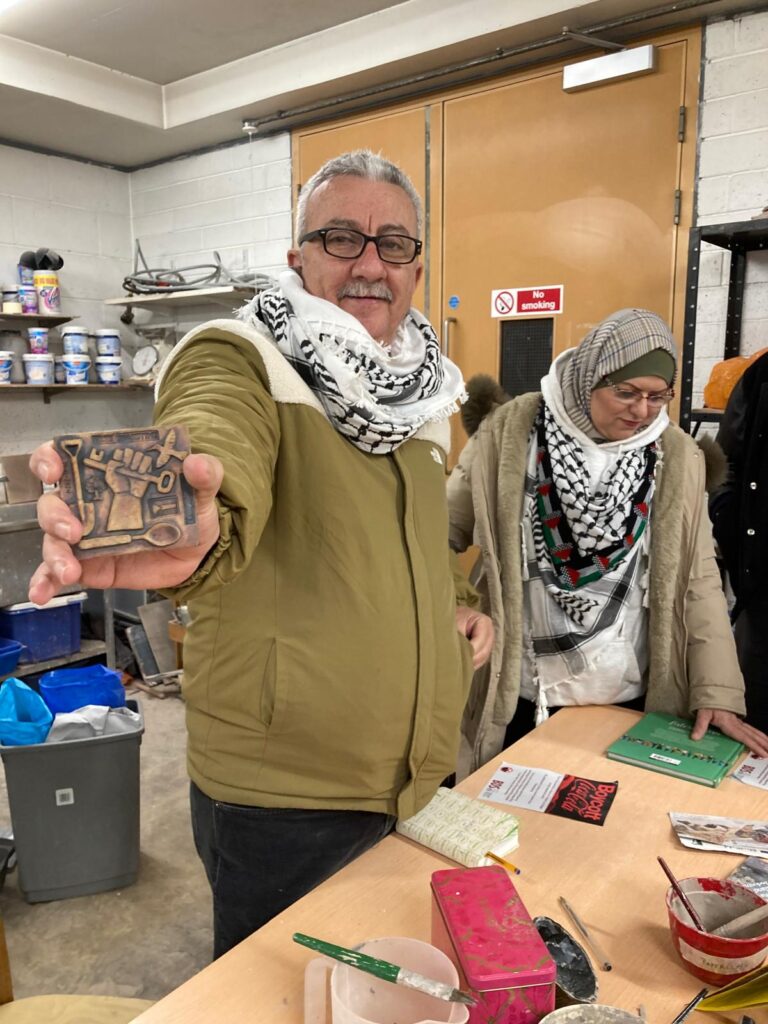
About the logistics of moving around Nablus, Mr Refaie said that “it takes two and a half hours to get from one part of the city” due to checkpoints and gates cordoning off certain districts in recent months.
Previously, the same journey would take closer to “ten minutes”.
Julie Pearn of the Sheffield Nablus Twinning Association, which organised the visit and had been campaigning for the Declaration of Friendship that was signed last October, spoke of the need for “financial donations and promises towards an emergency clinic being established in New Askar refugee camp” in order to circumvent the need to cross checkpoints to receive urgent medical care.
Earlier in the week, the Bishop of Sheffield’s advisor on interfaith and public affairs, Reverend Huw Thomas, hosted a dinner event where Mr Refaie and Ms Hasanain shared their experiences with Christian, Jewish and Muslim members of the local community.
Dr Pearn added that: “The people of Sheffield have extended warm and generous welcome to our Palestinian guests, who in turn have powerfully presented the terrifying and absolutely unacceptable circumstances they live in under the brutal illegal Israeli occupation.
“At the same time, they have constantly demonstrated their humanity and humour. Firm and enduring friendships have been made.”
The visitors also met with the Lord Mayor of Sheffield, Cllr Jayne Dunn, in addition to the leaders of the three main political parties represented in the council.
